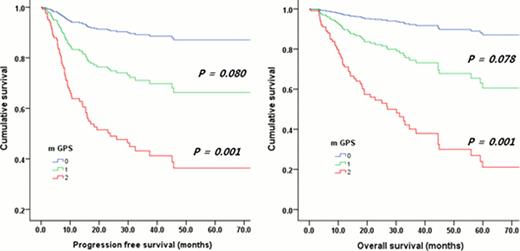Abstract
Abstract 5089
Systemic inflammatory responses as evidenced by CRP and albumin have reported as a useful indicator of prognosis in patients with advanced cancers. We retrospectively evaluated the relationship between the systemic inflammation score and survival in 213 patients with DLBCL receiving the first-line R-CHOP chemotherapy between October 2003 and December 2011 at Chonnam National University Hwasun Hospital. Patients were assorted into three groups based on initial serum CRP, albumin and LDH level at diagnosis, as named by ¡°modified Glasgow prognostic score (mGPS)¡±. Patients with elevated CRP (> 1. 0 mg/dL), hypoalbuminemia (< 3. 5 g/dL) and elevated LDH (> 1¢¥ upper normal value) were assigned a score of 2. Patients in whom one or two of these biochemical abnormalities was present were assigned of 1. Patients in whom neither of these abnormalities was present were assigned a score of 0. In Cox multivariate analysis, the independent poor prognostic factors for progression free survival (PFS) were mGPS 2 (HR 5. 415, 95% CI 2. 028–14. 454, P = 0. 001), ECOG PS ¡Ã 2 (HR 3. 504, 95% CI 1. 655–7. 419, P = 0. 001), and bulky lesion ¡Ã 10cm (HR 2. 030, 95% CI 1. 037–3. 972, P = 0. 039). In addition, the independent poor prognostic factors for overall survival (OS) were mGPS 2 (HR 5. 898, 95% CI 2. 028–14. 454, P = 0. 001) and ECOG PS ¡Ã 2 (HR 3. 525, 95% CI 1. 642–7. 567, P = 0. 001). The overall response rate, including complete response and partial response, for the R-CHOP chemotherapy was decreased according to the mGPS; 96. 7% at mGPS 0, 87% at mGPS 1, and 75% at mGPS 2 (P = 0. 009). This study suggest that the modified Glasgow prognostic score (mGPS) based on systemic inflammatory responses (CRP, albumin and LDH) was a useful prognostic indicator for OS and PFS and also a reliable method to predict the response for R-CHOP chemotherapy in patients with newly diagnosed DLBCL.
No relevant conflicts of interest to declare.
Author notes
Asterisk with author names denotes non-ASH members.


This feature is available to Subscribers Only
Sign In or Create an Account Close Modal